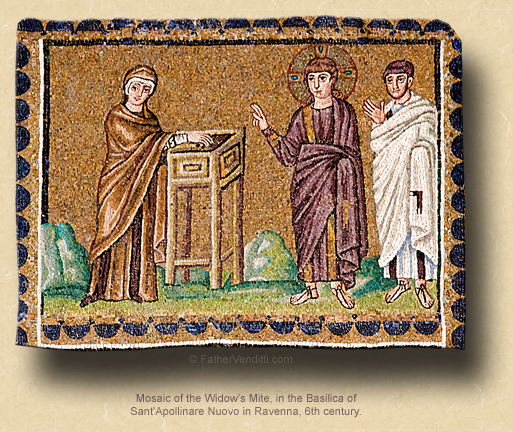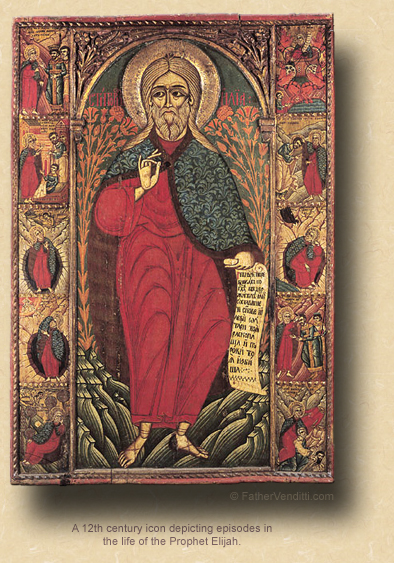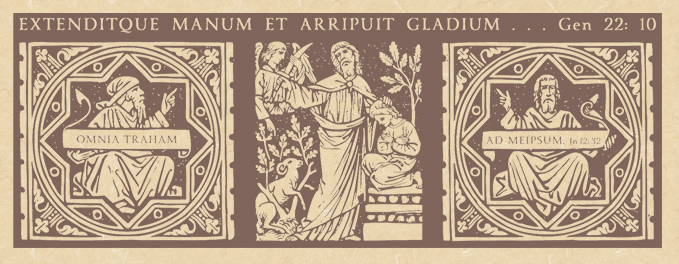In the Whisper of a Gentle Breeze.
The Thirty-Second Sunday of Ordinary Time.
Lessons from the secondary dominica, according to the ordinary form of the Roman Rite:
• I Kings 17: 10-16.
• Psalm 146: 7-10.
• Hebrews 9: 24-28.
• Mark 12: 38-44, or 41-44.
The Fifth Remaining Sunday after Epiphany.*
Lessons from the dominica, according to the extraordinary form of the Roman Rite:
• Colossians 3: 12-17.
• Psalm 43: 8-9.
• Matthew 13: 24-30.
The Twenty-Fourth Sunday after Pentecost; and, the Synaxis of the Holy Archangel Michael & All Angelic Powers.
First & third lessons from the pentecostarion, second & fourth from the menaion, according to the Ruthenian recension of the Byzantine Rite:
• Ephesians 2: 14-22.
• Hebrews 2: 2-10.
• Luke 8: 41-56.
• Luke 10: 16-21.
FatherVenditti.com
|
 9:05 AM 11/8/2015 — Today's Gospel lesson is very familiar to all of us. Back during my days as a parish priest, the diocese would always arrange to have the annual Bishop's Appeal begin on the day this passage was read; I guess they wanted to make sure every poor widow was giving her last two cents. But the point of the episode is simplicity itself: generosity, at least in the mind of our Lord, is never a question of how much, but of how much of a sacrifice it is. The contribution made by the widow observed by our Lord was worth more, even though it was much smaller than everyone else's, because it came from what she, herself, needed to live on. It's not a complicated lesson, and it seems almost incredulous that our Lord would feel the need to even pull his disciples aside to explain it to them. He does so, of course, because it enables Saint Mark to make a note of it for us so we can read about it and share in the lesson. 9:05 AM 11/8/2015 — Today's Gospel lesson is very familiar to all of us. Back during my days as a parish priest, the diocese would always arrange to have the annual Bishop's Appeal begin on the day this passage was read; I guess they wanted to make sure every poor widow was giving her last two cents. But the point of the episode is simplicity itself: generosity, at least in the mind of our Lord, is never a question of how much, but of how much of a sacrifice it is. The contribution made by the widow observed by our Lord was worth more, even though it was much smaller than everyone else's, because it came from what she, herself, needed to live on. It's not a complicated lesson, and it seems almost incredulous that our Lord would feel the need to even pull his disciples aside to explain it to them. He does so, of course, because it enables Saint Mark to make a note of it for us so we can read about it and share in the lesson.
But today's liturgy presents to us the story of another widow, just as important, though not as familiar to us, perhaps, because we meet her in our first lesson from the First Book of Kings. It's an episode in the life of the greatest of the Old Testament prophets, Elijah. It stands out in my mind because I had served for many years as pastor of a couple of parishes in an Eastern Catholic Church, where the feast of the Holy Prophet Elijah is a major Holy Day. One of the things that distinguishes the churches of the East from the Roman Church is that the Roman Church does not celebrate any liturgical commemorations for the saints of the Old Testament. In the Eastern Churches, there are many such commemorations, and the feast of the prophet Elijah is one of the most popular. And the chants for the liturgical services of that day, particularly those of vespers the night before, call attention to four episodes in his life which have a spiritual meaning for our own lives.
First of all, this particular prophet had an extraordinary experience of the presence of God. In the First Book of Kings we find Elijah wandering around looking for God. He himself says he is “jealous for God”; he wants to see God. But he’s looking for God in all the wrong places. He’s looking for God in the magnificence of nature, in all the grandeur of the desert around him. And he comes to a cave and goes inside, and there we read:
Then word came to him to go out and stand there in the Lord’s presence; the Lord God himself would pass by. A wind there was, rude and boisterous, that shook the mountains and broke the rocks in pieces before the Lord, but the Lord was not in the wind. And after the wind, an earthquake, but the Lord was not in the earthquake. And after the earthquake a fire, but the Lord was not in the fire. And after the fire, the whisper of a gentle breeze. Elias, when he heard it, wrapped his face in his mantle … (1 Kings 19: 11-13 Knox).
It’s an extraordinary passage, because it begs the question: where are we looking for God? In some magnificent sign, some overwhelming manifestation of his power? And when we don’t see that, do we then conclude, as many people have, that there is no God? Look at our Lord. When confronted with the prospect that Jesus was the Messiah, what do the synagogue leaders say? “This can’t be the Messiah. This is just some ordinary Joe from Nazareth. The Messiah will be a great man.” Well, our Lord is a great man, and much more, but not as they were defining greatness. God came to earth as the whisper of a gentle breeze: the Son of a carpenter, from their own country.
So, where are we looking for God? For those of us who are Christians, there’s a great temptation to view the spiritual traditions of our own faith as old and passé, even in a Christian tradition as spiritually rich as our own Catholic Tradition. A number of years ago, when I was a parish priest, I gave the parish a presentation about a spiritual tradition in the Church known as Hesychaism, a very mystical approach to prayer dating from the earliest days of Christianity in the East. And I did that because I had some people in the parish who had a tendency to latch on to whatever new wave guru type spirituality they read about in the Ladies Home Journal in their search for inner peace. But God isn’t in these new and fantastic things. God is here, where we have always known him to be: in the Blessed Eucharist, in the sacrifice of the Mass, in the sacraments of the Church, in the images of the saints, in the reading of the Scriptures, in the daily prayers of faithful Catholics who know no more than what they learned in Sunday School or read in their catechism—in the whisper of a gentle breeze. Nothing new, nothing great, but in the things with which we are all familiar.
The second episode of Elijah’s life of which the Eastern liturgical texts speak is his confrontation with the pagan priests of Baal. It’s a very dramatic story and somewhat disturbing. The worship of the god Baal was the dominant pagan religion of Elijah’s time, and many of the Jews had been suckered into it through the influence of the emperor, Ahab, and his crafty wife, Jezebel. They were attracted to the worship of Baal because of the great and magnificent displays that the priests of Baal would put on for them, cutting themselves with knives and appearing to feel no pain—just as we were discussing: looking for God in new and magnificent things instead of in the whisper of a gentle breeze. So, Elijah challenges the priests of Baal to a kind of liturgical competition. He suggests that they build two altars in the presence of the people, one to their god and one to his. Then they would pile wood on each altar, and pray to whichever was the true god to send down lightening to ignite the wood on the altar of the true God. So, they agree to this; but, the priests of Baal are hedging their bets, so they put dry wood on their altar and give Elijah damp, green wood for his.  Then they both begin to pray, and immediately lightening strikes Elijah’s altar and the damp, green wood roars into a giant bonfire. And when the people see this they fly into a rage against the priests of Baal and kill them all. Hence, the chants for vespers say, “O wise Elijah, thou hast massacred the priests of confusion.” Then they both begin to pray, and immediately lightening strikes Elijah’s altar and the damp, green wood roars into a giant bonfire. And when the people see this they fly into a rage against the priests of Baal and kill them all. Hence, the chants for vespers say, “O wise Elijah, thou hast massacred the priests of confusion.”
What’s important for us to consider here is not the massacre of the pagan priests, but rather the fact that God didn’t even require the dry wood. The wood of our souls is often green and damp because of our tepidness, our slavery to our passions, our spiritual laziness, our many weaknesses and sins; and yet, God can still ignite in us the fire of His love and His will and the faith of the Church that worships Him. We don’t have to be perfect and pure for God to live and work through us. He lives in us in spite of ourselves, particularly when we receive Him worthily in Holy Communion. And we can be purified by that fire to live even better lives.
The third episode of Elijah’s life spoken of in the liturgical texts of the Eastern Churches is the one for which he is most famous, and which is the reason that most Eastern Christian Churches, both Catholic and Orthodox, bless cars on the Feast of the Prophet Elijah. At the end of his life, Elijah, because of his intimate relationship with God, at the moment of his death, is taken up to heaven in a chariot made of fire. It's obviously an Old Testament prefiguring of both the Ascension of our Lord into heaven and the Assumption of the Mother of God into heaven. And it makes sense. Having found God in the whisper of a gentle breeze, having allowed ourselves to be consumed by the Divine Fire of God’s will, we should begin to care less and less for the things of this world, because the less we belong to the earth, the more we belong to God. Our lives begin to change, and we begin to live as the saints did, not part of this world, but in anticipation of our true home, which is heaven.
And all of these things converge in the singular episode in the life of the prophet Elijah related to us in today's first lesson. When Elijah arrives in the city of Zarephath it's in the middle of a great famine, and people are dying of starvation left and right. The first person he meets is a poor widow, from whom he asks a cup of water to drink, and a piece of bread to eat. She tells him that she has only enough for herself and her son to eat one last meal together, and once they've finished that, they will die. Elijah tells her not to be afraid, and believe that if she obeys the Lord God, symbolized of course, by obedience to His prophet, all will be well. So, she goes and makes Elijah a little cake with the last measure of flour in her jar, and—low and behold—she ends up having enough food to feed herself and her son for year. Such was the extent that God blessed and rewarded her generosity. And here we can plainly see how she is related to the widow observed by our Blessed Lord in the Gospel lesson, and why these two passages are brought together in today's Mass: generosity from one's want, rather than from one's surplus, yields the greatest reward.
It's interesting to note that, right after this episode of Elijah's meeting with the widow at Zarephath, her son suddenly dies, and Elijah raises him from the dead. It's unfortunate that those sentences are not included in today's first lesson, because they provide the proper orientation to view all of this: the reward of blessings that true generosity obtains for us is not a financial one. The fact that the widow of Zarephath was able to eat for a year after making Elijah the little cake is only emblematic of her true reward, which is to be found in eternal life, as symbolized in Elijah raising her son from the dead. When our Lord saw the widow in the Synagogue put her two cents into the collection basket, there's no mention of her walking off and stumbling over a bag full of money just fallen from heaven; her reward is clearly a spiritual one. And when our Lord was explaining to the Jews that salvation was not going to be restricted to them alone, he said, “Indeed, I tell you, there were many widows in Israel in the days of Elijah when the sky was closed for three and a half years and a severe famine spread over the entire land. It was to none of these that Elijah was sent, but only to a widow in Zarephath in the land of Sidon” (Luke 4: 25-26 NABRE), His point being that salvation was not to be restricted to the Jews; but, for us, it also means we don't have to be perfect in order to go to our Blessed Lord for help.
The life of grace—the spiritual life—the life of inner peace and holiness is available to all of us. But we cannot look for it where it is not. We find it in the Mysteries and traditions of the Church to which we already belong. And we don’t have to be perfect to benefit from them. Our lives can be as imperfect and green and damp as the wood on Elijah’s altar, and God can still grace us, if we are willing for him to do so, if we are willing to make an effort to turn away from the world and the things of the world and turn our attitude to heaven, living our lives for that goal rather than for some earthly reward.

* Because the date of Easter is variable, so are the number of Sundays from Pentecost until the First Sunday of Advent; yet, the Roman Missal of the extraordinary form does not provide texts for Sundays beyond the Twenty-Third Sunday after Pentecost. Therefore, if there are more than twenty-three, the texts for these Masses are taken from the Masses which were previously omitted after Epiphany (with the exception of the Last Sunday after Pentecost, which is always the Sunday before Advent, and for which there are specific texts). In this way, the Missal provides for every Sunday in it to be celebrated at one time or another in the course of the year. This year, the first of these left-over Sundays is the Fifth Sunday after Epiphany.
|

